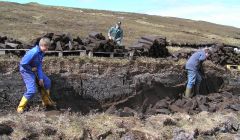Council / Councillors warn of ‘slow death of local authorities’
Shetland disadvantaged by centralising forces within Scottish Government and CoSLA
LOCAL authorities may be facing a slow death thanks to a trend of falling Scottish Government support, the Shetland Islands Council policy and resources committee heard on Wednesday.
Studying a “deeply worrying” report from executive manager of finance Jamie Manson, councillors stated that there needed to be a shake up of COSLA’s resource allocation formula that allegedly favoured cities over rural areas.
SIC leader Steven Coutts, who chairs the committee, said that the financial situation for councils gets “more depressing year after year”, with Shetland being hardest hit this year of any of the 32 local authorities.
The SIC has to dip into its reserves to the tune of £17m for 2019/20 financial year in order to balance its books – including an “unsustainable” £3.5m draw – that is the amount that is removed from the council’s core reserve after inflation has been included.
The report says: “The financial outlook is for reductions in Scottish Government revenue funding to councils. This will mean continued and increasing financial pressures on council services, especially those that are not protected.”
South Mainland councillor George Smith said that the government wanted to “distribute less and less each year to local authorities and we are having to use our reserves unsustainably.”
He added: “This is a very, very worrying report in terms of the future of local government. It’s time we woke up to the fact. We are only able to deliver the services that we can because of our sustainable reserves.”
Without that reserve input, Shetland would be in a worse position than some of the other Scottish councils that were already “calling a crisis”.
Smith said: “Either we have a slow death of local authorities or we have a rethink on the value of local authorities.”
North Isles councillor Ryan Thomson said that the Scottish Government was pleading poverty while claiming it was giving councils more money than ever, but had failed to pass on a Brexit contingency fund that had been granted by Westminster. Some of that money had been included in the general grant to councils and the rest (£54m) was being retained in a central reserve.
Become a member of Shetland News
North Mainland councillor Alastair Cooper said that Shetland tended to do very well when there was plenty of money about, but when there was no money it was hit hardest, as a result of the COSLA distribution methodology.
He also said that the notion within COSLA circles that Shetland was sitting on a heap of cash should be dispelled. “That’s not cash, that’s reserves,” said Cooper.
Smith said that the tension he perceived within COSLA was essential between urban and rural councils and that Shetland was also damaged by being a small authority and one of the only five independents which were less influential than the political party affiliated authorities.
Councillors also heard there was a centralising force in the Scottish Government that regarded local authorities as “irrelevant”.
But there was a need for the government to seriously examine whether the sort of settlement agreed for Shetland was sufficient to run an island local authority in an adequate way.
Central Mainland councillor Ian Scott questioned whether there was any fighting spirit within local authorities. “When you are kicked, you need to kick back,” he said.
There was general agreement among councillors that Shetland residents were far better provided with council services than almost anywhere else and these services were the envy of visitors to the isles.
It was also hoped that the sort of preventative work undertaken by the Integration Joint Board – partnership between council and NHS Shetland – should go some way to reducing pressures on future budgets.
Become a member of Shetland News
Shetland News is asking its readers to consider paying for membership to get additional perks:
- Removal of third-party ads;
- Bookmark posts to read later;
- Exclusive curated weekly newsletter;
- Hide membership messages;
- Comments open for discussion.
If you appreciate what we do and feel strongly about impartial local journalism, then please become a member of Shetland News by either making a single payment, or setting up a monthly, quarterly or yearly subscription.

























